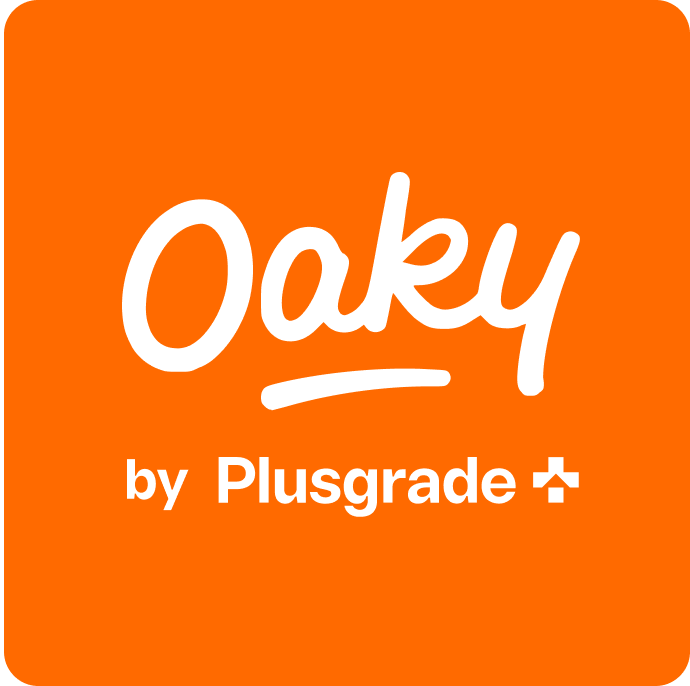What is hotel upselling: 10 key techniques and ideas
Oaky
•
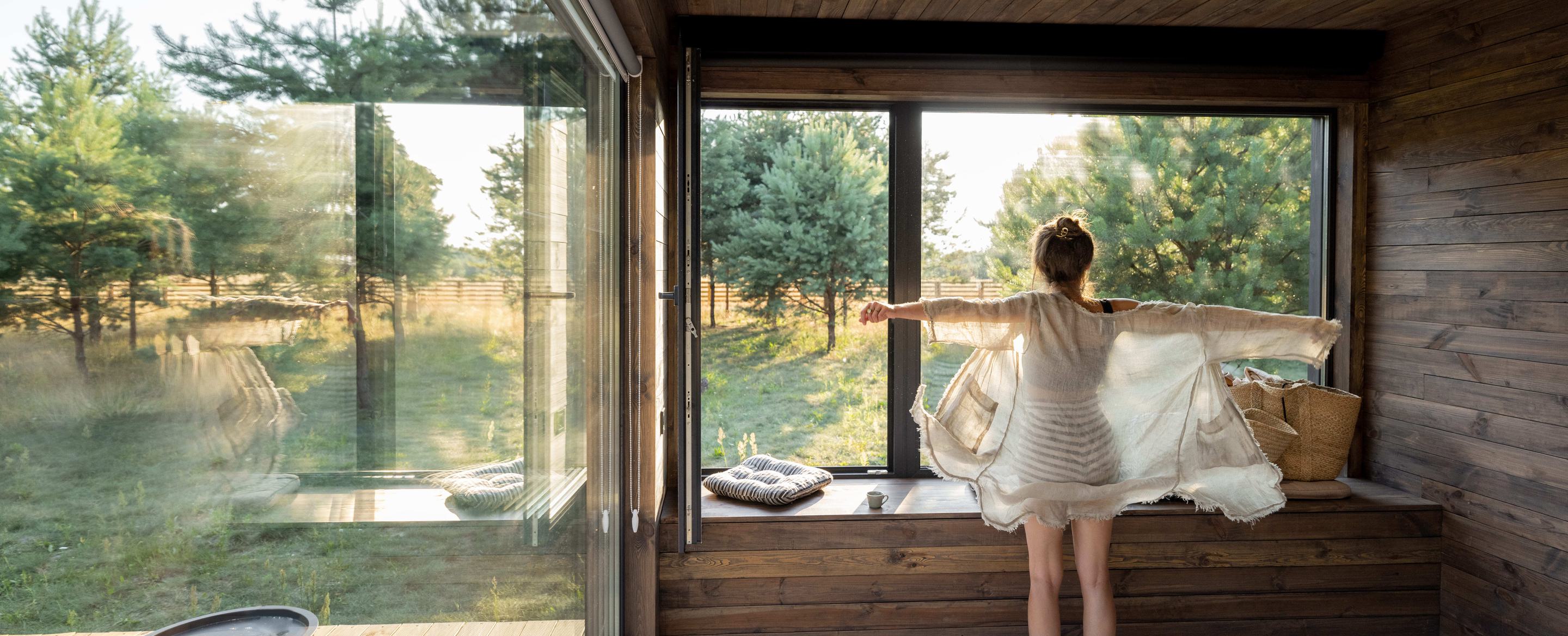
Mastering the art of hotel upselling has become an important strategy for elevating the guest experience and driving revenue. Yet, many hotels struggle to implement it in an effective and profitable way.
Discover how to capture upselling opportunities to boost guest satisfaction and your bottom line. On top of that, explore our key upselling ideas and techniques to help you make the most of your inventory and amenities.
What is hotel upselling?
Hotel upselling is the practice of offering guests extra services or amenities to enhance a guest's stay, such as room upgrades, in-room extras, spa treatments, or F&B deals, and the hotel's revenue.
Although upselling is an essential component of hotel revenue management, you shouldn’t view it as purely transactional. When done right, upselling contributes to guest satisfaction and benefits both the hotel and the guest.
What is the difference between upselling and cross-selling?
Upselling focuses on persuading guests to opt for a more expensive option within the same category, such as upgrading to a higher room category.
On the other hand, cross-selling encourages guests to purchase additional amenities or services from different categories, like spa treatments or dining options. For the sake of simplicity, the term “hotel upselling” is often used as an umbrella term to include “cross-selling.”
What are the benefits of hotel upselling?
Apart from the apparent benefit of generating more ancillary revenue, hotel upselling is also used to increase guest satisfaction. Let’s take a closer look at the benefits upselling can bring to your hotel:
1. Increase guest spending and embrace total revenue potential
By upselling higher category rooms and add-ons, you can increase your revenue 100-fold, depending on your hotel's upsell potential. For example, Oaky’s customers have reported generating between €35 and €200 on average in upsell revenue per guest per month by using automated and personalized upselling.
The higher your upsell potential (in other words, the various room types, room attributes, facilities, and services you have on offer), the more upsell revenue you can generate every month.
Upselling also helps you go beyond just room bookings and maximize revenue from other avenues, such as F&B, spa, transportation, and more. Since raising rates is not a sustainable strategy to drive profitability, proactive upselling comes in handy to reach revenue goals faster and more effectively.
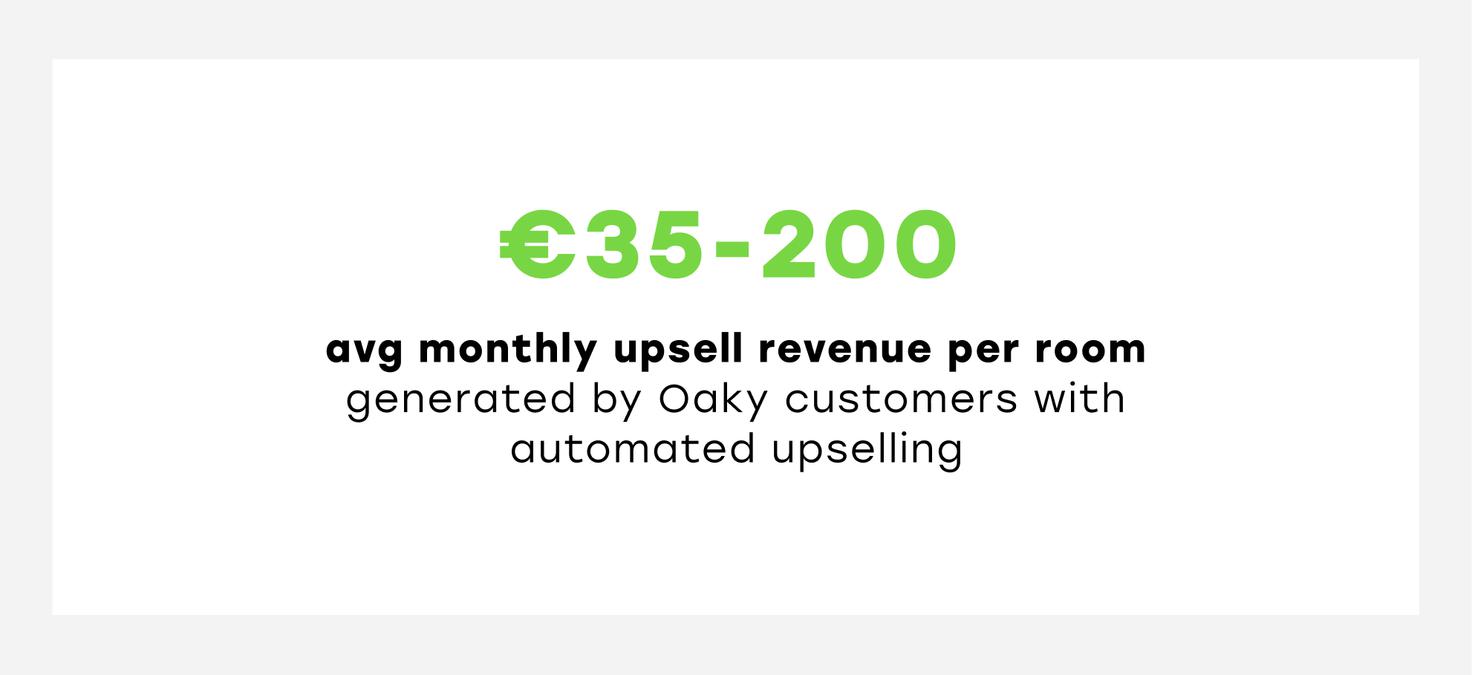
Maximize average guest spending with smart upselling
2. Elevate the guest experience
With upselling options offered, guests can customize their stays to their liking, leading to memorable stays.
By presenting guests with tailored options that add real value to their stay, hotels can significantly elevate overall guest satisfaction. For instance, offering a room upgrade to a more spacious room with a stunning view can transform a standard stay into a memorable one, resulting in higher guest satisfaction.
3. Increase guest loyalty
Want to create long-lasting relationships with your guests? When your hotel demonstrates its commitment to understanding and meeting your guests’ preferences through personalized offers, you’re likely to see increased repeat bookings.
This not only fosters repeat business but also strengthens your brand's reputation in the competitive hotel industry.
4. Differentiate your brand in the competitive landscape
Unique upselling offers also contribute to brand positioning and differentiation in the competitive landscape. For example, Grand Hotel De Draak communicates its sustainability stance by upselling the Hotels for Trees deal. This eco-friendly deal, created by Oaky and Hotels for Trees, encourages guests to skip housekeeping in exchange for planting a tree. Grand Hotel De Draak has planted 2,653 trees in two years (of which 2,098 were planted in 2023 alone).
5. Mitigate lost revenue during low season and decreased occupancy
Upselling can be a valuable source of extra revenue, as it enables you to capitalize on ancillary opportunities. It can help prevent revenue losses from overbooking and compensate for reduced occupancy.
What can you upsell (6 hotel upselling ideas)
When it comes to upselling, opportunities are endless.
Upselling in your hotel shouldn’t be limited to hotel room upgrades or breakfast. However, you should always keep your target guest in mind and consider the operational implications for your upselling strategy so as not to create an abundance of extra work for your other departments.

1. Room upgrades and room-related deals
Do you have various room types at your hotel and keep overbooking a standard room category to mitigate revenue losses? This is a common scenario for hoteliers who struggle to encourage guests to book high-tiered rooms and miss out on potential revenue.
However, if you start presenting a selection of paid upgrades pre-arrival, you can capitalize on your diverse room types and room attributes (attribute-based selling).
Your upselling options might include:
Premium rooms, such as suites, junior suites, etc.
Various room attributes (rooms with a balcony, a sea view, a garden view, a more spacious room, or a bathtub in the room).
2. Early check-in and late check-out
These upsells are extremely popular among guests, as they provide extra convenience and reduce the hassle for your guests. For an additional cost, you can sell the opportunity to check in earlier/check out later than the standard time.
In fact, these upsells accounted for only 12% of the total upsell revenue for Oaky's customers.
The good news is that you can offer these deals at multiple touchpoints—pre-arrival, at check-in, and during their stay. However, timing is key. Pre-arrival is the most effective stage for upselling early check-in, while guests are more likely to opt for late check-out once they are in-house.
To maximize revenue, consider applying dynamic pricing to these room-related upsells by integrating Oaky with an RMS. This allows prices to adjust based on demand, meaning that when demand is high, you can sell early check-in and late check-out at higher rates, increasing your overall earnings.
3. Food and beverage deals (breakfast, dinner, etc.)
F&B holds a lot of potential for your upselling strategy. You can upsell the following:
Breakfast (according to our data, it accounts for 29% of total ancillary revenue generated by our customers)
Dining options at your hotel restaurant
Dinners for special occasions (e.g. birthday dinner, anniversary dinner, etc.)
Wine tasting, beer tasting
3 or 4-course dinners featuring local produce.
Offer F&B deals and signature experiences both prior to arrival and at check-in. If your goal is to drive sales of exclusive dining experiences, the front desk is the perfect place to highlight them. After all, who better than an enthusiastic front desk agent to showcase your chef’s signature dishes?
3. Transportation and parking
At an extra cost, you can help your guests to get around your destination. You can upsell the following:
An airport shuttle service
A meet-and-greet service at the airport
A card for public transportation
Shuttle services to local attractions
Bike or e-bike rental
As many people still travel by car, offering a parking spot is also an excellent idea.
If you don’t have parking spots on your premises, arranging for nearby parking is a good option to make your guests' lives easier.
If you target luxury guests, valet parking is a must. It elevates the prestige of your hotel and underscores your commitment to exceptional guest care.
4. Wellness and spa services
Wellness travel surged in popularity right after the pandemic. According to the findings of the Global Wellness Institute (GWI), the wellness sector will continue to grow in the coming years. By the end of 2024, it’s projected to reach $6.3 trillion, $7.4 trillion in 2025, and $8.5 trillion in 2027, which is almost double what it was in 2020.
Give your guests an opportunity to relax and unwind by offering the following wellness deals:
A single spa treatment or spa packages
A training session with a fitness instructor
Yoga, pilates or aqua aerobics classes
Detox drinks
Wellness-focused menus
In-room wellness amenities (e.g. yoga mats, resistance bands, or compact weights).
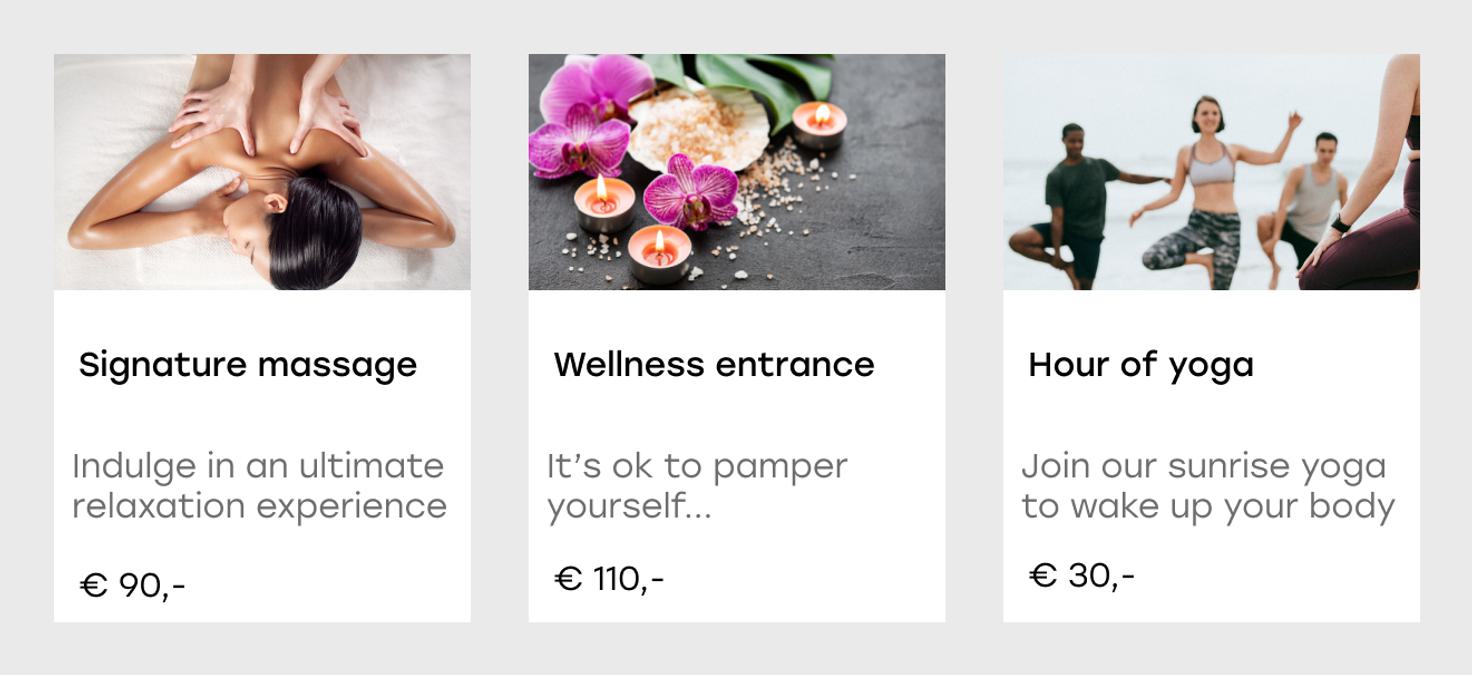
5. Activities
Spruce up your upselling mix by adding exciting activities. Keep your target guests in mind when deciding which activities to offer.
Hotels often partner with local businesses to arrange enticing activities and experiences, yielding mutual, cross-promotional benefits. A few ideas include:
Chef-led cooking classes
Guided hiking tours
City tours
Historical site visits
Watersports such as kayaking, snorkeling, or jet-skiing
Local craft workshops
Kids' adventure camps or educational tours.
6. Special occasion packages
It’s no secret that people often travel to celebrate special occasions, providing you with ample opportunity to delight your guests by offering packages specifically tailored to their event, such as:
Birthday package
Honeymoon package
Anniversary package
New Year’s Eve package
Any other package to celebrate a local holiday (for example, the Chinese New Year).
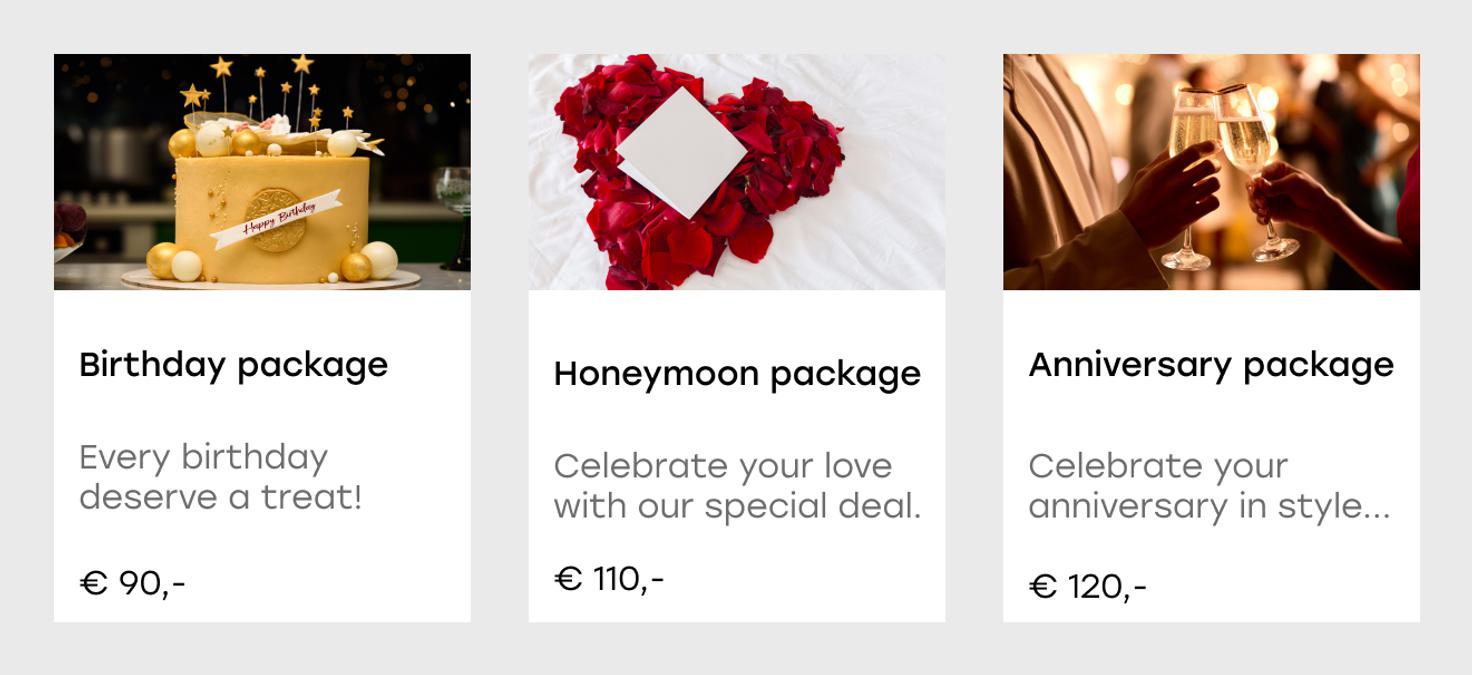
When is the best time to upsell?
To achieve the best results with your upselling strategy, create multiple upselling touchpoints throughout the entire guest journey.
While most hoteliers believe upselling is only effective at check-in, there are more opportunities to communicate your offerings to guests.
Before booking
Before your guests even make a booking, why not spark their interest in your additional services and add-ons? It's all about creating anticipation!
Showcase your special deals on your hotel website and social media platforms. By doing so, you'll pique their interest and make it more likely that they'll indulge in these extras, either during booking or through pre-arrival messaging.
Another idea is to integrate your upsell options into a booking engine to drive exposure for add-ons and offers at the last step of reserving a room via your website.
Pre-arrival
As guests anticipate their stay, you can boost guest spending by offering additional services and upselling hotel rooms before they set foot in your door.
The pre-arrival stage is crucial for communicating your room upgrades and additional offers, as:
- Your guests are ready to unlock their "travel wallet" and spend money on experiences and extras after they've secured flights and accommodation
- In many cases, there's plenty of time between booking and guest arrival. This gives you a golden opportunity to build anticipation and excite guests with additional options.
But when exactly should you promote your offers? This depends on your property type, as guest's behavior differs depending on the destination, purpose of travel and context of the trip.
🌴ResortsBest timing: 20 days before arrival
Average CTR: 57% (a 26.6% increase compared to the standard 0–30 day window)
Insight: Resort guests tend to plan in advance and appreciate early access to exclusive options.
🏨 City Hotels
Best timing: 7 days before arrival
Average CTR: 34% (a 21.4% increase)
Insight: City travelers often book closer to their travel date and respond well to timely, last-minute offers.
✈️ Airport Hotels
Best timing: 21 days before arrival
Average CTR: 39% (a 56% (!) increase)
Insight: Business travelers value convenience and typically plan ahead.
🗻Non-City Hotels
Best timing: 21 days before arrival
Average CTR: 47% (a 17.5% increase)
Insight: Guests at non-city hotels tend to take longer trips and prefer careful planning around the three-week mark.
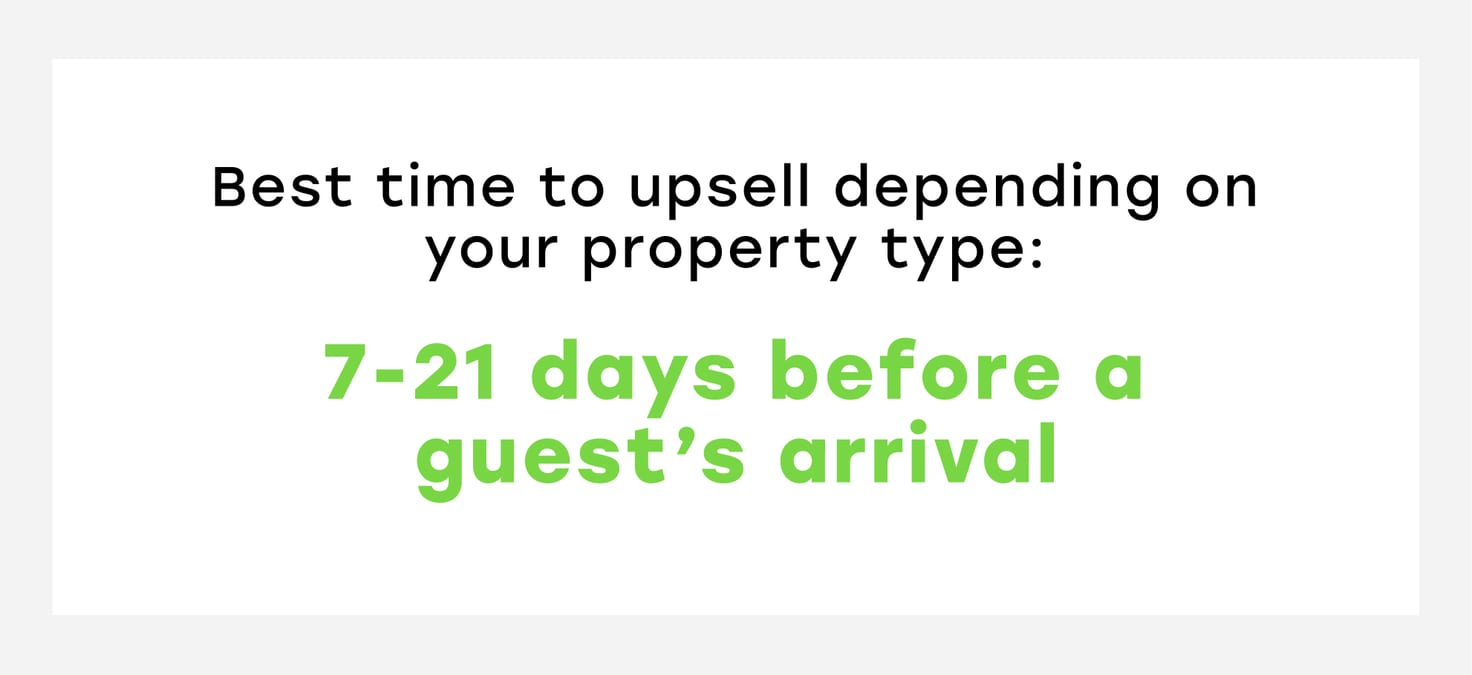
As a follow-up, you can send another email three days before arrival, which usually leads to a 42-43% click-through rate and a 12% conversion rate.
By upselling hotel rooms before arrival, you can fill suites and higher-tier rooms while freeing up standard rooms for resale. Selling services in advance also helps you adjust staffing levels accordingly, optimizing costs.
At the front desk
Check-in is a golden opportunity to communicate your upsells. In fact, hotel front desk upselling can help you generate 5-9 times more revenue than pre-arrival upselling. However, combining both approaches remains the most lucrative strategy.
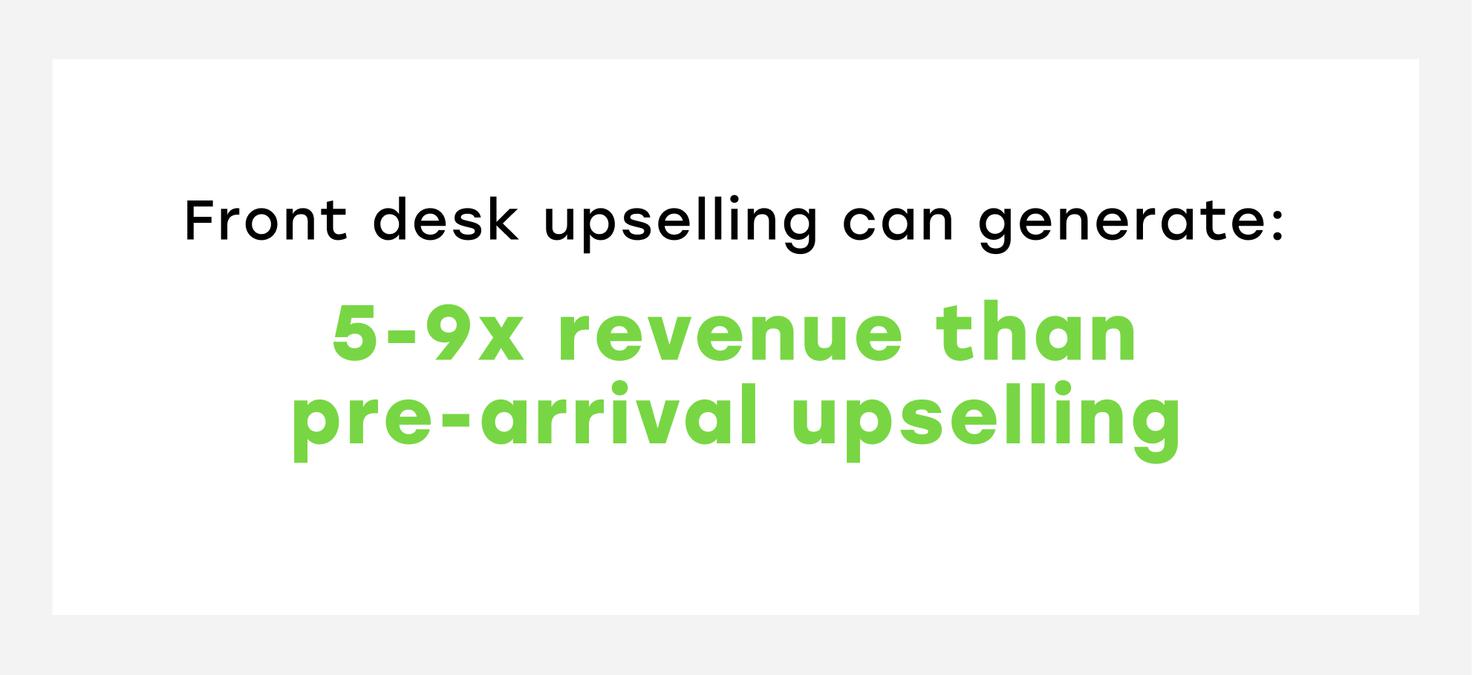
Face-to-face interaction with a guest is a golden opportunity for front desk agents to engage with guests and understand their immediate needs. For example, a guest checking in for a romantic getaway might appreciate an offer to upgrade to a room with a private balcony and a stunning view, or a business traveler might value the convenience of room service or access to a quiet workspace.
By training front desk staff to recognize upsell opportunities and communicate them effectively, hotels can significantly boost their revenue.
However, to upsell successfully at check-in, your agents need to have real-time access to the most crucial information — room and service availability and prices. Luckily, hotel upsell software like Oaky can help you tackle this challenge.
Oaky's Front Desk Module equips your agents with a simple dashboard giving insight into guest booking information as well as real-time upselling recommendations based on the guest segment. This way, agents can upsell on the fly without having to search through spreadsheets or verify information in the PMS. Once a deal is purchased, it’s automatically recorded in Oaky and synced with your PMS, reducing manual work and saving time.
See Front Desk Upselling in action!
In-stay
While selling hotel rooms might not be possible at this stage, your guests will still appreciate the opportunity to book your signature dinner or a city tour. Self-service technology will enable your guests to book deals and services with one click and save time for your front desk team.
To put it into practice, you can use hotel upsell software solutions like Oaky that to provide your guests with ongoing access to the deals and services you have on offer.
10 hotel upselling techniques
1. Incorporate pre-arrival upselling
The pre-arrival stage is a valuable moment to make your guests aware of your upgrades and relevant offers.
Send personalized, pre-arrival emails highlighting upgrades, spa packages, and special dining options. This not only builds excitement but also gives guests the chance to plan and budget for these extras, leading to higher conversion rates.
2. Segment and personalize your upsells
Not all guests are the same. So, why offer them the same deals?
Use rich guest data to segment and tailor your upselling offers. Personalized offers make guests feel valued and increase the likelihood of conversion.
For example, families with kids will appreciate kid-friendly activities. For business travelers, consider offering room service as an upsell option as they value convenience
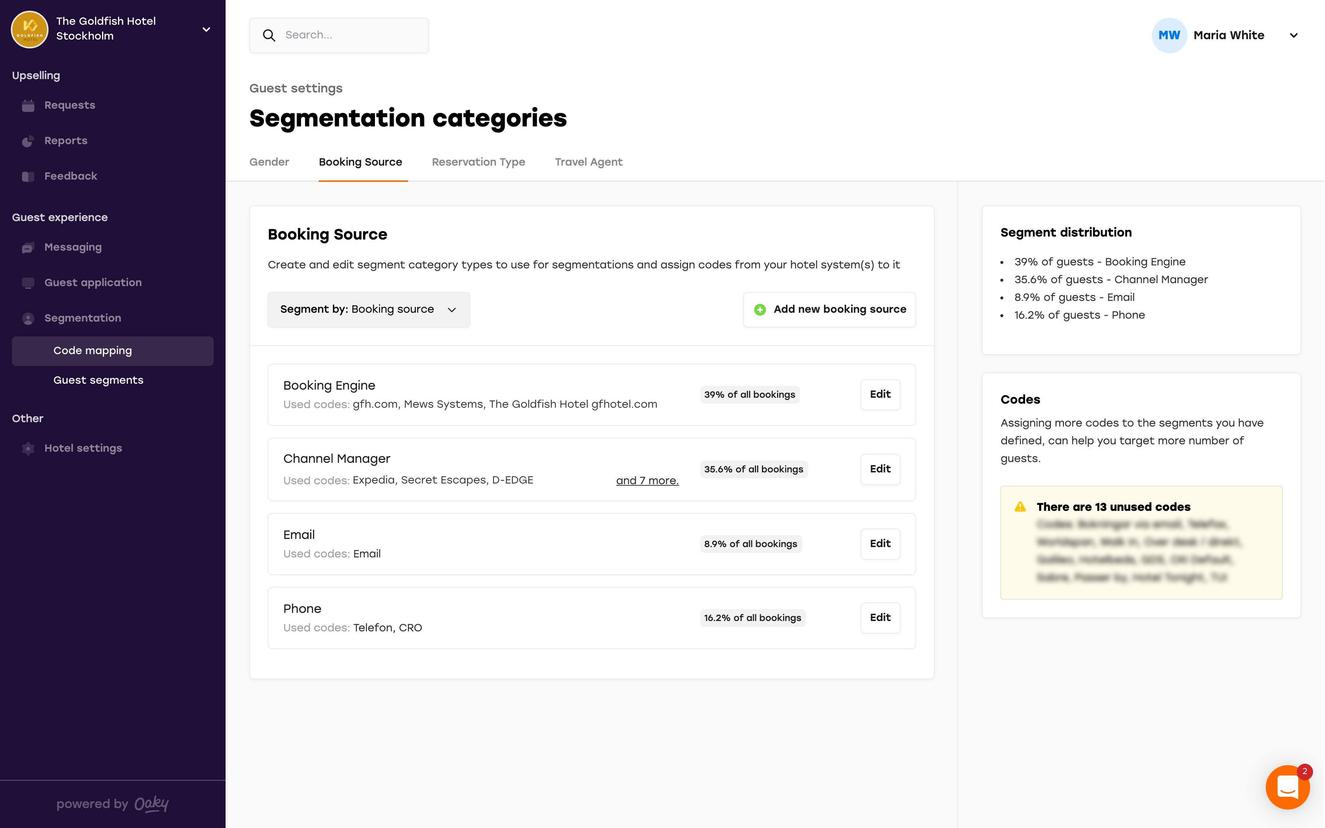
3. Use appealing images to promote your deals
A picture is worth a thousand words, especially when it comes to presenting your add-ons and extras. Use high-quality images to showcase your rooms, dining options, and other amenities. When guests can visualize the luxury and comfort, they're more likely to spend a little extra.
When promoting room upgrades, the best practice is to include at least 3 pictures per room upgrade, including a bathroom picture (it helps to boost conversions).
Make sure your pictures look as close to reality as possible to avoid creating unrealistic expectations.
4. Unleash your creativity to sell unique upsells
Think outside the box! Offer unique upsells, like private cooking classes with your chef, guided tours of local attractions, or custom picnic setups. These creative options not only delight your potential guests but also set your hotel apart from the competition.
5. Sell experiences, not features
Guests are more likely to be swayed by the promise of a memorable and unique experience than just a list of features. Instead of just mentioning the additional square meters your guests can get when purchasing a room upgrade, describe the feeling your guests can look forward to — the comfort of the plush bedding and the tranquillity of the private balcony. Make it about the experience they'll have, not just the extras.
6. Use dynamic pricing for your room upgrades and deals
Maximize your revenue by adjusting your prices based on demand. Use dynamic pricing to offer room upgrades and special deals at competitive rates. This flexibility allows you to capture more sales during high-demand periods and still attract interest when it’s quieter.
With upselling software, you can also extend your dynamic pricing strategy to early check-in and late checkout deals, driving additional revenue.
7. Train your front desk team on upselling
Your front desk staff are your frontline upsellers. Provide them with training on how to recognise upsell opportunities and attract guests effectively. A friendly conversation when a guest arrives about available upgrades and services can significantly boost your sales.
8. Upsell at the right time
Offer upsells at moments when guests are most likely to appreciate them. When it comes to pre-arrival upselling, the best practice is to present your deals 7-21 days before the guest’s stay, depending on your property type.
When upselling at check-in, you can spot these opportunities during your conversation with your guest. Stay relevant and be attentive to your guest’s needs to personalize your offers, which can make a big difference to your conversion rate.
9. Use hotel upsell software to maximize your efforts
Take advantage of technology to streamline your upselling efforts. Hotel upsell software like Oaky can streamline the upsell process, automate personalised offers and provide real-time availability, making it easier to present relevant upsells and track their successes. With this tech solution, you can consolidate the process across departments, making it consistent and hassle-free.
10. Integrate your upsell software with your property management system
Make sure your upsell software is integrated with your property management system. This ensures seamless communication and up-to-date information on room availability and pricing. Integration helps provide a smooth experience for your staff and guests, leading to more effective upselling.
Hotel upselling script
There are multiple ways to upsell to a guest. Factors like the moment of the guest journey and your guest segment will impact your approach. What remains true is that it's essential to avoid pushy sales tactics, as no one appreciates hard selling.
Pre-arrival email script:
Dear [Guest’s Name],
We are delighted to welcome you to [Hotel Name] soon!
As you prepare for your upcoming visit, we wanted to ask if there is anything special you’d like us to arrange in your room before you arrive?
We would like to ensure you have an outstanding experience and would love to give you the opportunity to personalize your stay [Link to a selection of upgrades and offers].
Looking forward to your visit!
Front desk script:
Front Desk Staff: Welcome to [Hotel Name], [Guest’s Name]!
How was your journey? I see you’ve booked our classic room, but I wanted to let you know about an opportunity to enhance your stay.
Our premium suite, which is usually fully booked, is currently available. We can upgrade you to this room for an additional €30. While our classic rooms are comfy and nice, our premium suite is an absolute delight. What I personally like is the stunning ocean view, which looks even more incredible during the sunset. Would you be interested?
I noticed you’re here as a couple. We also have some fantastic restaurant and day spa specials available right now that our guests absolutely love. Would you like to hear more about them?
How to improve your hotel upselling program
Cultivating an upselling culture is the most crucial aspect of a successful upselling program. Your team has to be aligned with the goals you’re pursuing with upselling and realize the importance of this process for the hotel business and its guests.
Here are a few points to help you elevate your upselling program:

Have an upselling champion
An upselling champion is a member of your front desk team who excels at upselling. They possess excellent communication skills, a deep understanding of the hotel's offerings, and the ability to anticipate and fulfill guests' needs and preferences. An upselling champion is critical as they serve as a role model for the team, easing the workload of front desk managers and revenue managers.

Integrate upselling into your SOPs (Standard Operating Procedures)
Upselling should become an integral part of your team's daily routine. SOPs ensure that upselling techniques are standardized and consistently applied across all guest interactions, resulting in a cohesive and professional approach to upselling. SOPs can also provide a framework for measuring and evaluating your team's performance, allowing you to hold them accountable for meeting upselling targets and goals.
Make upselling part of your daily briefings
Including upselling in daily briefings keeps everyone on the same page. By discussing upsell opportunities, goals, and techniques, your team stays informed and motivated to reach the targets.
Set up incentive plans
Understand the motivations of your team and tailor your plan according to what they look for (you might need a few different plans depending on different motivations). It will help boost your upsell results tremendously.
Use gamification and training to entice your team further
With training, your team will become more confident in upselling, which will make a drastic difference in their motivation. By adding an element of healthy competition, you not only incentivize your team to strive for more, but you can also set milestones and celebrate successes.
How does hotel upselling software elevate your upsell revenue?
The mission of upsell software in the hotel industry is to empower hoteliers to streamline the entire upsell process and provide hotel guests with multiple upsell touchpoints throughout the guest journey.
Hotel upsell software automates the process of upselling and eliminates manual work while also allowing hotels to reach out to guests with targeted offers at the right time and with the right selection of offers.
One of the primary advantages is that hotel upsell software like Oaky can be connected to a wide range of PMSs globally, ensuring seamless data exchange between the two systems and minimizing manual effort.
